Inside Whitehall: Britain's ‘last closed shop’, the doors of the Civil Service need bursting open
At junior and senior levels, recruitment lacks diversity

When Gordon Brown’s former spin doctor Damian McBride published his infamous memoirs last year, press coverage naturally focused on his account of the nefarious goings-on in Downing Street. But McBride had a previous incarnation as a fast track civil servant. And his book’s critique of the Whitehall machine is perhaps the most pertinent.
McBride starts with a caustic take-down of what he characterises as “the last great closed shop in all the British professions”.The civil service, he argues, recruits new entrants at a young age in its own image with supposedly ‘unbiased’ assessments which in reality exclude vast numbers of capable candidates.
These tests favour people who are confident, outgoing, come from good schools in affluent areas at the expense of the eccentrics, the quiet types or those from more diverse backgrounds.
Even at interview, he argues, the civil service tend to pick candidates who are already like them. Because of the general rule that once you’re in the service you tend to be in it for life, this becomes self-perpetuating. If you miss out on the fast stream, no matter how successful you are in business or other parts of the public sector it is very hard to transfer mid-career.
I was reminded of McBride assessment when reading a recent drier report from the Civil Service Commission – the body set up to safeguard the independence of Whitehall’s recruitment process from political interference. The Commission has been in a longstanding tussle with the Cabinet Office Minister Francis Maude over the recruitment of the most senior civil servants.
Mr Maude is keen for politicians to be given a bigger say in appointing departmental heads or permanent secretaries from outside the civil service – and in particular the right to choose between any external candidate who is judged capable of doing the job by the independent panel.
By contrast the Commission has argued that this is unacceptable political interference and that the Prime Minister alone should have a say and only then when the panel believes two candidates are of equal merit.
Now this might sound a bit arcane to many readers – but it matters because it goes to the wider point made by McBride about the make-up of the civil service. Just as the fast-track recruitment scheme tends to favour and then reinforce a certain type of generalist civil service so, at the top, the Commission system tends to make it more difficult to bring in leaders from the outside that will be transformative.
Those candidates who are judged to be the most competent are likely to be those who are already in system because they know how the system operates. They may not be best candidates but they are likely to be the most successful.
Now there is perfectly plausible argument that this is a good thing, has worked well for many years and should not be tinkered with.
But I’m not sure I agree. Those skills needed to be a good civil servant are not so different from those skills needed to be a good business leader, head teacher or hospital manager.
It might not be sensible to parachute them in as departmental heads but it should be possible to recruit more of them mid-career – opening up that possibility at a later date.
So why is the Department of Health not actively encouraging hospital managers or doctors to routinely apply for policy posts in Whitehall? Why don’t head teachers take policy posts in the Department of Education? It happens a little – but not merely as much as it should.
The Civil Service Commission plays an important role in ensuring long term civil service impartiality from the political pressures of the Government of the day.
But it needs to go further. It says it believes the country is best served by a Civil Service which recruits and develops the best and most diverse talent.
If that is the case it should push the civil service to open up Whitehall recruitment across all grades, question the very existence of the fast track scheme and encourage the extensions of innovative ideas likes the summer diversity internships. Then, perhaps, we would have a civil service that represented Britain.

Join our commenting forum
Join thought-provoking conversations, follow other Independent readers and see their replies